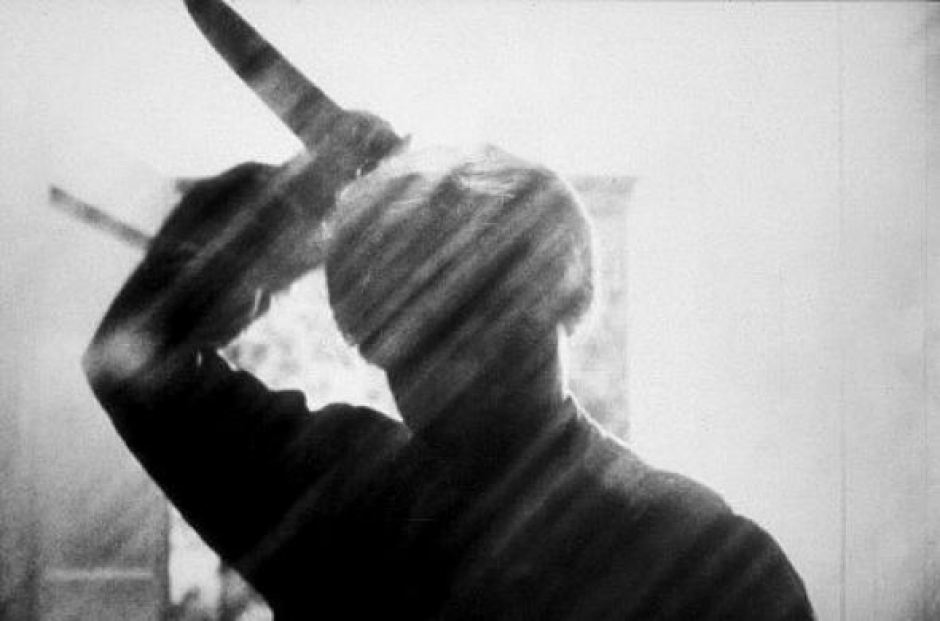There must be a palpable sense of trepidation when filmmakers and documentarians approach the topic of film itself, when the camera has to fetishize its mirror image in the form of a genius auteur or the upstart aesthetics of an eternally restless art form. Here, director Alexandre O’Phillipe reaches out like Indiana Jones for the prize golden idol: the shower scene from Hitchcock’s Psycho, the cornerstone clip of every film studies class since it first tore the screen asunder. Of course, the giant stone ball still looms: how will the documentary choose to frame a dissection of The Greatest Ever Scene in Cinema History Ever (as it so desperately wants to suggest)?
For the most part, pretty well. Even for those well-versed in the construction of the shower scene, and the importance of Psycho to cinema history, will still find new nuggets to delight in. Which melon was used for the stabbed-flesh sound effect? The answer awaits. How was the killer’s face obscured in the shot (above) which launched a thousand slasher movies? Perhaps not quite how you might expect. But it’s not all just trivia; there is a valiant effort to painstakingly pull apart the scene almost frame by frame, through each of the 78 camera set-ups and each of the 52 shots, with some delightful moments of split-screen to show how the visions generate the meaning. Simultaneously, the whole gamut of Psycho miscellany is deftly drawn in to keep the context alive. There are comparisons drawn to the wonky Gus van Sant remake, a brief reading from the Robert Bloch source novel, occasional close looks at the shooting script and the Saul Bass storyboards, as well as wider reflections on late fifties America and its attitudes to violence, horror, motherhood and bathrooms. True to the mastery of the scene itself, these elements are spliced together with precision and care; all disciplines get a bite of the cherry, and no one point is ever particularly laboured.
It was also lovely to see, among the talking heads, the faces of industry professionals who rarely get such an opportunity to enthuse about their craft. And while there are famous figures such as Peter Bogdanovich, Jamie Lee Curtis (daughter of Janet Leigh), and Guillermo Del Toro, they were out-played by the insights of the editors, composers, screenwriters and academics whose excitement at the chance for nerding indulgence is palpable and pleasing. Best of all is the foregrounding of Janet Leigh’s body double Marli Renfro, whose body is the one we actually witness (not) being bloodily murdered in the ubiquitous shower. There’s a reflection late on about fragmentation as a pervading theme of Psycho, which is well reflected by the presence of Renfro. It was not just Leigh in that shower, it was her double too and, by extension, all women, and, further still, all of us who have ever felt in some way vulnerable.
The experts and their kin certainly lend 78/52 a warmth, although there is, at times, something of an excess of reverence. The interviewees are placed in Bates Motel rooms, filmed in crisp black and white, and presented with the shower scene and other key moments on tiny TV sets. And while this is certainly useful for precise and specific analysis, it occasionally gives way to doe-eyed men (and it is mostly men) saying ‘wow’ at a shower curtain like they’ve just witnessed a supernova. The couch of actors, who inexplicably include Elijah Wood, are the most prone to these pointless and somewhat irritating gawps of adoration.
As a 90 minute precis of the impact and construction of Psycho and it’s iconic scene, 78/52 affords some genuine thrills and insights, but as the climax is reached and Leigh finally lies dead on the bathroom floor, her eyeball minutely twitching when it shouldn’t, there’s a final discomforting taste in the air. Beyond the craft, beyond the art, we start to become somewhat painfully aware that we are voyeurs, perhaps participants, of the adulation of a naked woman being hacked to death in a deeply sexualised murder. And, as noted, the screen is showing us a pantheon of mainly white, privileged men taking real personal pleasure in artful construction of this visceral fantasy. What that says about the proclivities of our society and its culture remains, at the abrupt end, as empty as Norman’s mother’s eye-sockets. Perhaps it is aptly Hitchcockian that we go in seeking amazement and leave feeling unsettled and distinctly unclean.

